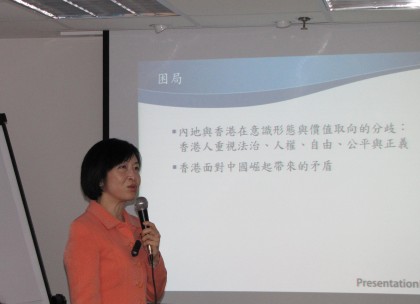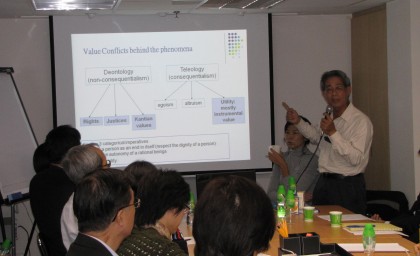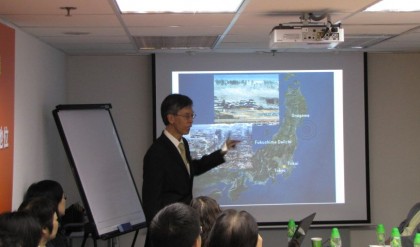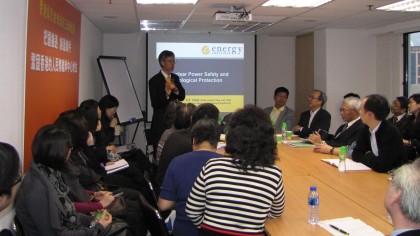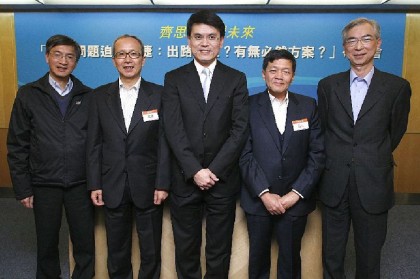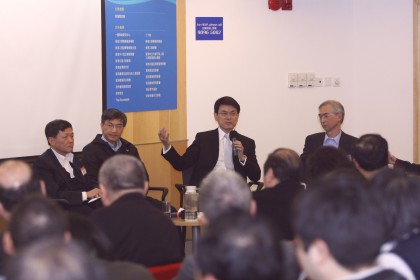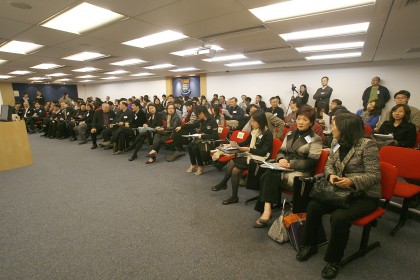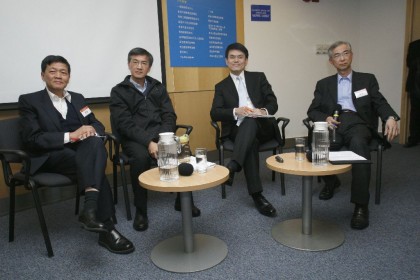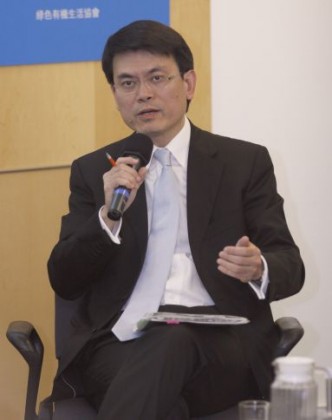2011.12.9 Hong Kong has achieved significant progress in developing offshore RMB businesses in recent years. In his recent visit to Hong Kong, the Vice-Premier Mr Li Keqiang announced a series of financial measures to further support Hong Kong’s role as an offshore RMB centre. In this regard, HKIC invited Mr Wong Kai Man, Consultant and Convenor of HKIC’s RMB Study Group, to speak on this important subject. Mr Wong analyzed the history of RMB business in Hong Kong, and discussed the latest measures in developing and consolidating the offshore RMB center. He also exchanged ideas with more than 80 attendees including financial practitioners, business executives, scholars and members of the public.
Tapping into the concerns about the offshore RMB centre’s future growth, Mr Wong offered three development strategies: 1) expanding the use of RMB, optimising the control measures, and promoting RMB investment products. As regards the state’s objective to gradually and steadily promoting the liberalisation of its capital account, Mr Wong indicated that full capital account convertibility requires four major conditions: 1) a stable macro-economy; 2) a perfect financial supervision system; 3) adequate foreign exchange reserves; and 4) strong financial institutions. However, as RMB is not yet freely convertible, Mr Wong reminded us to pay attention to risk management.
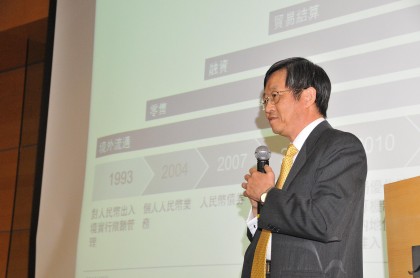
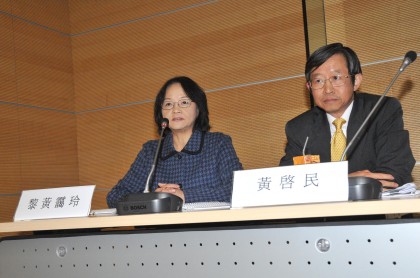
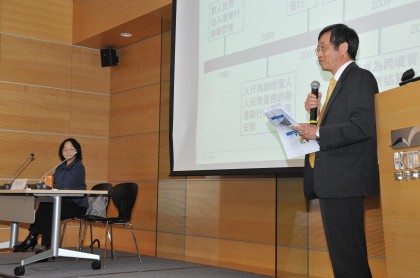
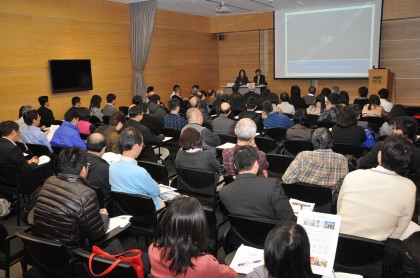
~~~~~~~~~~~~~~~~~~~~~~~~~~~~~~~~~~~~~~~~
2011.12.7 2011.12.7 Is economic development by nature in conflict with environmental protection? How can the two camps collaborate in the society’s best interest? HKIC invited Dr. William Yu, Head of the Climate Programme of WWF-Hong Kong to address issues related to community and sustainable development in the face of environmental crisis.
Dr Yu analysed the present urban planning policy in Hong Kong and concluded that the so-called ‘non-place-oriented approach’ facilitates the exploitation of local communities. He highlighted that sustainability should not be a barrier for development; instead, there are some principles pertaining to sustainability planning. Planning officials should 1) focus on place that maintains the identity of local groups; 2) adopt a long-term perspective (i.e. 50-100 years); 3) establish a holistic outlook by linking different specialties; 4) focus on qualitative improvements than on quantitative growth in consumption and resource use.
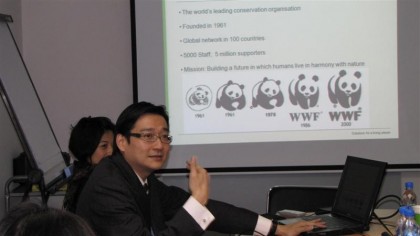
~~~~~~~~~~~~~~~~~~~~~~~~~~~~~~~~~~~~~~~~
2011.11.14 In the latest Policy Address, the importance of providing Hong Kong people with a quality living environment was again emphasised. HKIC has invited Mr. Edward Yau, Secretary for the Environment, to discuss the government’s priorities in dealing with all pressing environmental issues such as roadside air quality, waste management, and climate change. The talk was attended by about 40 participants. Mr. Yau stressed that the government will achieve the proposed initiatives through implementing policies on reducing the pollution of power plants and commercial vehicles, and promoting Guangdong-Hong Kong cross-border co-operation in achieving the emission reduction targets. He illustrated that one-third of the buses in Hong Kong has to be replaced in the next three years, and the replacement can take place in a ‘greener’ way: through the installation of emission reduction devices or the introduction of electric buses.
While higher environmental standards are set, Mr Yau indicated that the key to building Hong Kong a green city involves behavioural change of the citizens. That is, whether citizens can change their old habits to match up with the energy-efficiency policies adopted by the government. As far as the development of the environmental industry is concerned, Mr Yau believes that Hong Kong could establish its own environmental brands supported by local infrastructure and technology. Government statistics show that the environmental industry accounts for only 0.3% of the GDP and 0.9% of the total work force, suggesting that there is still much room for further development.
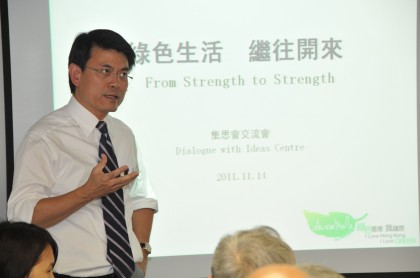




~~~~~~~~~~~~~~~~~~~~~~~~~~~~~~~~~~~~~~~~
2011.11.10 Healthcare reform has been one key topic on the government agenda in recent years, and the government has identified medical services as one of the Six Priority Industries for Hong Kong. Mr. Bernard Charnwut Chan, President of Asia Financial Holdings and Asia Insurance Company Limited, and a former member of the Executive Council of HKSAR, gave a talk at HKIC on the development of healthcare and medical services in Hong Kong. Speaking to around 40 participants, Mr. Chan shared his successful experience of operating a private hospital in Thailand, and analysed the strategies for Hong Kong. As a customer-driven service, he suggested that the private healthcare system should be developed in line with market conditions gradually and naturally.
Mr. Chan indicated that target customers’ affordability and availability of related services in customers’ home countries are the two prerequisites for developing medical tourism. Thailand, as he explained, has been successful because it can offer economical and special medical services to patients from overseas . Mr Chan stressed that the healthcare system of each country has its own strengths and weaknesses; it would be unwise to copy the model of another country. To develop medical tourism, Hong Kong has to hurdle the shortage of healthcare professionals and high medical costs.
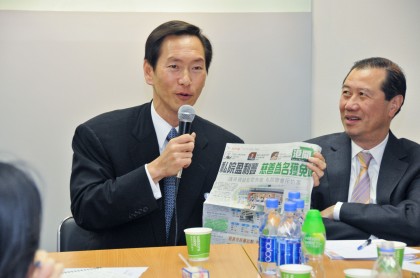
~~~~~~~~~~~~~~~~~~~~~~~~~~~~~~~~~~~~~~~~
31.10.2011 Governance has become an issue of common concern in the city, with noticeable public grievances in recent times. Tapping these concerns, HKIC organized a forum on the subject and invited Mrs. Fanny Law, Hong Kong Deputy to the 11th National People’s Congress and former Secretary for Education and Manpower, and Mr. Patrick Tsang, Project Consultant of HKIC, to share with some 60 participants their insights into and perspectives on issues related to the governance of the present administration.
At the forum, Mr Tsang shared his findings from a HKIC-commissioned study on Hong Kong Governance and singled out areas of deficiency in the present administration system. Amongst other recommendations, Mr Tsang suggested the administration should shoulder responsibility in developing the leadership of the civil servants through continuous education (in subjects like culture and belief, empirical and mathematical reasoning, ethnical reasoning), and in conducting public policy evaluations, one of the crucial elements of what he called ‘a self-improving governance system’.
Mrs Law considered that there is a pressing need for the leading body of the administration, including the Chief Executive, policy secretaries and their Permanent Secretaries, as well as members of the Executive Council, to cultivate mutual trust and consensus among themselves, and to show greater solidarity in the event of policy consultations. At the same time, the administration should strike to achieve both political accountability and administrative accountability, which as Mrs Law believes, could improve the overall governance performance.
19.8.2011 As the Chief Executive (CE) race hots up, HKIC invited Mr Lau Nai-keung, Member of the Basic Law Committee, Standing Committee of the National People’s Congress, to share his observations and insights on the new situations encountered by the next SAR government. In attendance were 60 professionals and senior executives.
Mr Lau analysed the qualities and prospect of each popular CE candidate. Considering the heaps of intensified social problems and deep-rooted social contradictions in the society, Mr Lau reckoned that the aspirant CE would win social acceptance if he/she is capable of mastering the prevailing social mood for changes. Mr Lau highlighted that the next CE and his/her team have a crucial job of striking a balanced social, economic, and political development.
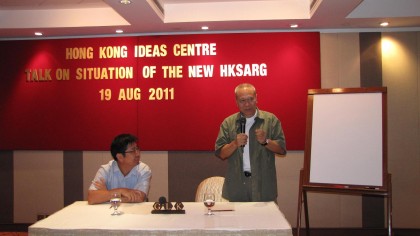
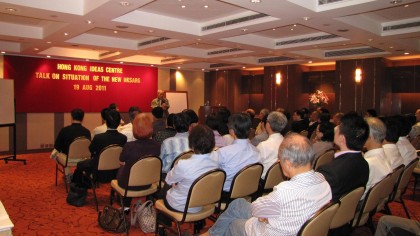
17.6.2011 Former Permanent Secretary for Works, Mr Mak Chai-kwong, was invited by HKIC to deliver a talk on ‘Urbanisation and Sustainable Urban Systems: the Hong Kong Story’. Speaking to around 50 participants, Mr Mak indicated that, in the past, heavy investment in infrastructure was the key to success in the development of our city’s hardware. Today, it is essential to focus on the ‘software’ to ensure the sustainable development of our city in the future. This includes the exemplification of various values such as the conservation of the environment and culture. Mr Mak commented that only 24% of the land is developed in Hong Kong. To develop Hong Kong as a quality city with quality of life, he urged that we should start planning the usage of the remaining part (excluding the 40% of land reserved for country parks).
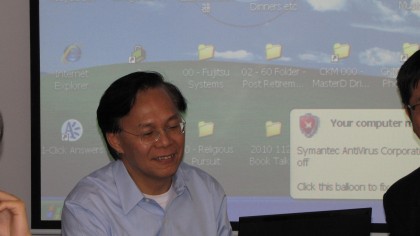
~~~~~~~~~~~~~~~~~~~~~~~~~~~~~~~~~~~~~~~~
16.6.2011 HKIC organised a forum on airport expansion and invited Mr Stanley Hui Hong-chung, Chief Executive Officer of the Airport Authority Hong Kong (AAHK), and Mr Wilson Fung Wing-yip, Executive Director of Corporate Development of the AAHK, to exchange with 40 professionals from various sectors (such as architecture, engineering, environmental protection, transportation, manufacturing, trade, exhibition, finance, economic research, legal, academic and media, etc.) on the Hong Kong International Airport Master Plan 2030. At the forum, Mr Hui and Mr Fung presented AAHK’s considerations for the two airport extension options under consultation, whereas the audience expressed their concerns on the feasibility, funding, as well as the potential economic and environment impacts of the options with suggestions.
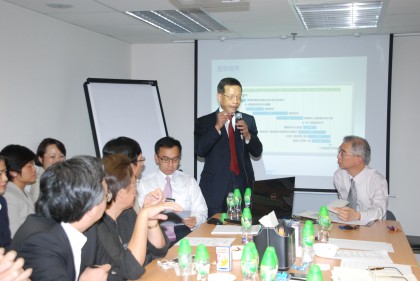
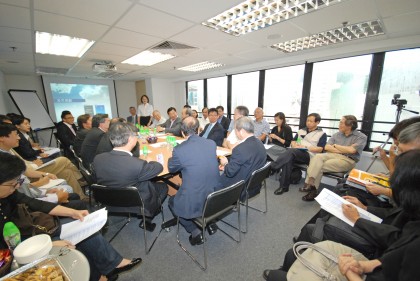








~~~~~~~~~~~~~~~~~~~~~~~~~~~~~~~~~~~~~~~~
17.5.2011 At the invitation of HKIC, Mr Tse Kwok Leung, Head of Economic Research Division, Bank of China (Hong Kong), gave a talk on the cooperation among Guangdong, Hong Kong and Macao under the National 12th Five-Year Plan. Speaking to 44 participants, Mr Tse shared his views on both opportunities and challenges to Hong Kong. With the widening gap between the sizes of Guangdong and Hong Kong’s economies, institutional and cultural differences between the two places are expected to become more prominent in the years ahead, Mr Tse reckoned that Hong Kong should be selective in its sectoral economic development; it should leverage on its advantages in finance, transport, and logistics so as to jointly develop the Greater Pearl River Delta metropolis and strengthen regional power amidst global competition.
Presentation (Chinese version only)
7.4.2011 A 9.0 magnitude earthquake, followed by a 14m tsunami, struck the East coast of Japan and damaged the nuclear plant in Fukushima on March 11, 2011. While the mishap aroused public concerns over the possible contamination of Japanese food, it also triggered widespread worries about the safety of nuclear plants already in operation or under planning around the territory. At the invitation of the HKIC, Dr H F Chan, Honorary Advisor of the Energy Institute (Hong Kong Branch), shared his expert knowledge and insights with 36 participants on safety issues of nuclear energy and protection against radioactivity. While nuclear power is, as Dr Chan concludes, largely safe, precautionary measures should be taken to minimise accidents at the Daya Bay Power Plant. To this point Dr Chan proposes to 1) review the safety measures and disaster management plan; 2) enhance existing backup and safety devices; and 3) establish an emergency plan for Hong Kong citizens in the event of radiation leakage.
10.3.2011 (Chinese version only)「廢物問題迫在眉睫︰出路何在?有無必然方案?」研討會
逾200人出席 座無虛設 交流熾熱
香港集思會於2011年3月10日舉辦以「廢物問題迫在眉睫︰出路何在?有無必然方案?」為題的研討會。香港集思會邀請到環境局局長邱騰華及兩位專家學者:香港中文大學地理與資源管理學系教授、中國環境戰略研究中心主任 — 林健枝教授,及香港理工大學土木及結構工程學系教授、香港理工大學環境技術與管理研究中心主任 — 潘智生教授,在會中作專題演講。同時邀請到香港集思會顧問、前地政總署署長劉勵超擔任研討會主持。
當日與會者逾200名,包括政策研究機構人員、學者、環保業界及工程界人士、環保關注團體代表、零售及餐飲業界人士、中小企、社企、區議員及廣大市民等,涵蓋範圍極廣。當晚座無虛設,與會者競相發言、主講者積極回應,經過3小時的熾熱交流,研討會在友好氣氛下完滿結束。
環境局局長邱騰華於會上表示:「香港的廢物管理策略,必須是多管齊下︰減廢、回收,引入現代化處理設施,及時擴展堆填區。」
「在落實各項減廢及回收措施方面,我們必須加強源頭減廢。香港目前的回收率為49%,政府會爭取在2015年把回收率提升至55%。」為了達標,政府會在全港及地區層面推動一系列的政策,包括︰
加強回收硬體設置
– 透過法例和資助形式為新建及現有物業加裝回收設施 ,加強硬體配套;
– 推廣於屋邨和商場就地處理廚餘 ,例如裝置廚餘機,並讓用戶先租後買
推動地區回收運動
– 于18區建立回收網路,推廣以物易物及廚餘回收 ;
– 透過前線政府部門的網路推動減廢
落實生產者責任計畫
– 實施第二階段塑膠購物袋征費;
– 廢電器電子產品生產者責任計畫 ;
– 就實施都市固體廢物收費諮詢公眾
此外,政府亦會引入以焚化為核心的現代化處理設施,污泥處理設施、綜合廢物管理設施及有機資源(廚餘)回收中心的設立,轉廢為能。與此同時,亦會擴建堆填區以處理三大類型的廢物:
1. 焚化設備規模以外未及處理的都市固體廢物
2. 不可焚化的廢物,如建築廢料
3. 經焚化的垃圾所餘下的灰燼
邱局長說:「隨著加強源頭減廢,引入現代化設施,我們預計至2015年,落入堆填區的廢物總量將由現時的13,300公噸,下降至11,500公噸;及至2018年,將近一步下降至8,000公噸。」
另一位講者林健枝教授則以時日無多為理由,促請政府落實生產者責任制(問題的製造者→問題的解決者) 的政策。他說:「在評估可接受的環境影響後,應以跨代/ 區域及善用僅有的資源的原則制訂一套綜合而可行的總體策略。」他又建議運用以下三個重建信心的政策工具:
1. 如期實施堆填限制 (Landfill ban) , 不再接收尚可回收或處理的廢物,從而促進回收業的建立。並加促配套措施的立法, 減少塑膠/易腐爛物料運送往堆填區。
2. 管理協議 (Management agreement) ,以環境表現作費用/獎勵/懲處的基礎, 條款由政府、服務供應商、社區人士及可信的協力廠商協商制定。
3. 回收業 不能過分依賴科技,必須透過教育提高市民的環保意識。
第二位講者潘智生教授則表示:「要達到在2015年由目前49%提升至55%回收率的目標,我們必須通過設立OWTF(廢物回收處理中心)、提高回收率較低的物品如玻璃及廚餘;減少使用包裝紙及落實生產者責任PRS(Implement producer responsibility schemes) 計畫。」潘教授以臺北為例,該城市在2000年實施垃圾隨袋收費後,回收數量迅速上升。
至於堆填區的問題,他指堆填區不能無限地擴展。因此,除了堆填之外,必須採取其他方法來解決 廢物問題。例如引入焚化設施,好處是它只占地11公頃,每天能處理3,000公噸的廢物,符合香港的需要。
是次活動在香港大學專業進修學院位於金鐘海富中心的校舍進行,並獲以下21個友好機構支持:
一國兩制研究中心
三十會
香港大學專業進修學院
香港大學畢業同學會
香港工程師學會環境分部
香港工業總會
香港中小型企業總商會
香港中文大學行政人員工商管理碩士課程
香港生產力促進局
香港水務及環境管理學會
香港政策研究所
香港食品委員會
香港專業及資深行政人員協會
香港零售管理協會
香港環境評估學會
香港廢物管理學會
香港餐飲聯業協會
傑出靑年協會
群策學社
綠色有機生活協會
The Roundtable
(以筆劃序)
Presentation by the Hon Edward Yau (bilingual)
Presentation by Prof. KC Lam (Chinese version only)
Presentation by Prof CS Poon
16.2.2011 HKIC invited Mr. CM Mak, Head of Electric Mobility Development of CLP Power Hong Kong Ltd., to share his knowledge and insights, including observations of overseas experiences, in electric driving. In attendance were 24 professionals and senior executives.
Mr. Mak has over 30 years’ working experience with CLP. Recently, he is in charge of the establishment of electric vehicle’s charging infrastructure and electric vehicle adoption. During 1997-2002, he was the Secretary General of the Electric Vehicles Association of Asia Pacific.
Mr. Mak considers that electric driving is at its initial stage of development in Hong Kong. Prospects will depend on the network of charging stations, charging fee, selling and rental price of battery, etc. Of concern, popularization of electric driving in Hong Kong has been largely hindered by the limited supply of right wheel drive vehicles.
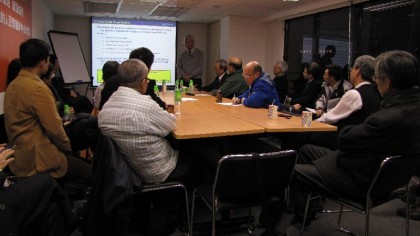
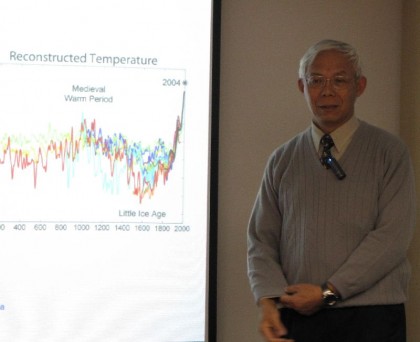
4.1.2011 A press conference was held to announce the third round study and recommendations to reinforce Hong Kong’s position as a RMB offshore centre. Meeting the press and speaking at the press conference were RMB Study Group members Mr K M Wong, Mr Leong Ka Chai, Ms Vivien Li, and Dr Elvis Luk.
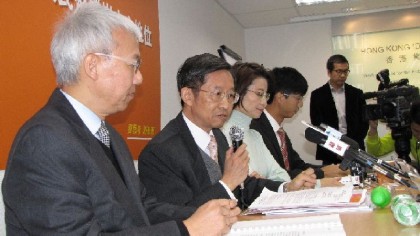
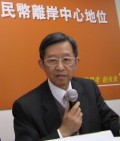
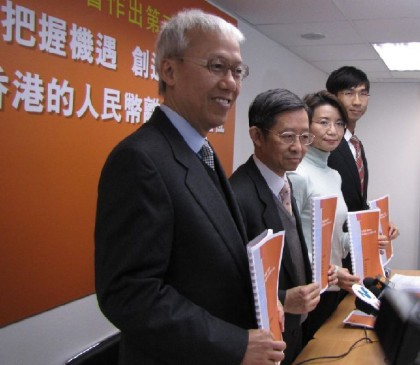
 ()
() 